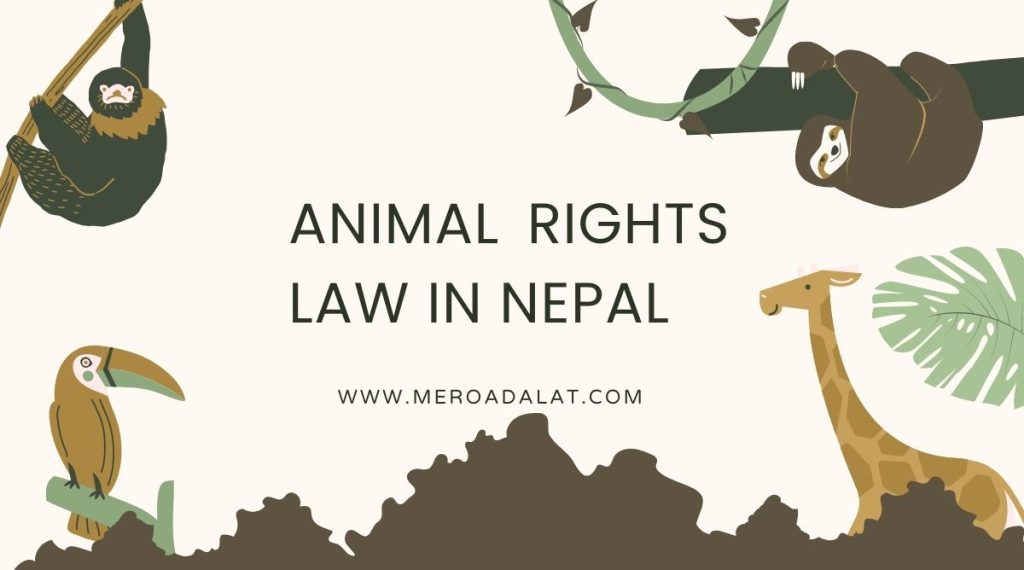After reading this article, you will be able to know the all information relating to animal rights law in Nepal.
Animal rights are moral principles grounded in the belief that non-human animals deserve the ability to live as they wish, without being subjected to the desires of human beings. At the core of animal rights is autonomy, which is another way of saying choice.
Human rights are rights inherent to all human beings, regardless of race, sex, nationality, ethnicity, language, religion, or any other status which include the right to life and liberty, freedom from slavery and torture, freedom of opinion and expression, the right to work and education, and many more.
Animal rights mean that animals deserve certain kinds of consideration, consideration of what is in their best interests, regardless of whether they are useful to humans, or an endangered species, and regardless of whether any human cares about them at all. It means recognizing that animals are not ours to use, for food, clothing, entertainment, or experimentation.
Animal exploitation involves the use of animals by humans for a variety of purposes, such as food production, usage as experimental subjects, or even as pets, which stands in direct contradiction to animal rights. Animal rights can also be violated when it comes to the human destruction of animal habitats. This negatively impacts the ability of animals to lead full lives of their choosing. Accepting the doctrine of animal rights means:
- No experiments on animals
- No breeding and killing of animals for food or clothes or medicine
- No use of animals for hard labor
- No selective breeding for any reason other than the benefit of the animal
- No hunting
- No zoos or use of animals in entertainment.

Animal Rights Law in Nepal
Constitution of Nepal
No. 15 of Schedule 8 grants the power over animal health to the local government, No. 21 of Schedule 8 obliges the local government to the protection of wildlife and No. 7 of Schedule 9 of the Constitution of Nepal grants the power over wildlife, and bio-diversity to the Federation, State, and Local Levels.
Muluki Criminal Code, 2074 (2017)
Chapter 5 is related to offenses against the public interest, health, security, facility, and morality.
Section 116
It prohibits reckless conduct with respect to animals and birds.
It provides no one keeping or caring and cultivating any violent or other animal or bird of him or her or under his or her control or custody, knowingly or recklessly omits to take such precautionary measure with that animal or bird or prevent any probable danger to cause the death of or grievous hurt to anyone from such act or from such animal or bird.
A person who commits, or causes to be committed, the said offense shall be liable to a sentence of imprisonment not exceeding one year or a fine not exceeding ten thousand rupees or both sentences.
Section 117
It mentions that a person should not leave their bird/animal under their control in another’s home, land or public path, or public place. If a person fails, he/she will be liable to up to three months of imprisonment or a fine of up to five thousand or both.
Chapter 18 deals with offenses relating to rape.
Section 227
It prohibits bestiality which means no person shall have, or cause to be had, sexual intercourse with an animal. Sexual intercourse with a cow will amount to a punishment of 2 years imprisonment and a fine of up to two thousand. If other animals are raped, it is punishable by imprisonment for up to one year and a fine of up to ten thousand.
Section 289
It protects cows and ox. It prohibits anyone from killing or injuring them or causing them to kill or injure them. The punishment for such an act is imprisonment for 3 years. If someone beats and injures a cow or ox causing them disability then such offender will be punished with 6 months of imprisonment, for other injuries will be punished with 6 months of imprisonment, and for another injury, they will be fined up to fifty thousand rupees.
However, killing cows and ox in the act of self-defense is not culpable.
Section 290
It states that no one should act cruelly towards birds and animals. No one is allowed to beat, kick, over-drive, over-load or employ in any work or labor or for any purpose any animal which, by reason of its age or any disease, infirmity, wound, sore or other cause is unfit to be so employed or administer any injurious substance to any animal or torture animal in any other way or abandon a domesticated animal in public due to the result of disease or old age or behave inhumane or cruelly in any other form.
But using minimum force in order to make any animal or bird do any work or carry a load according to its physical capacity or make it run, with the objective to teach or train it to do any work or make it efficient in its work is allowed.
A person who commits the offense aforementioned in Section 290 shall be liable to a sentence of imprisonment for a term not exceeding three months or a fine not exceeding five thousand rupees or both sentences.
Section 291
It prohibits the killing of birds and animals in public. It mentions that unless otherwise mentioned no animal is allowed to be killed in public unless such slaughtering has been done since time immemorial like in a fair, feast, exhibition, or event place, etc. The sacrifice of such animal or bird shall be done other
than in a religious place where the sacrifice of animals or birds has been in practice from time immemorial. If there is any other alternative other than sacrificing the animal it must be adopted and if there is no alternative it must be done as determined by the manager of the concerned religious place.
A person who commits, or causes to be committed, the offense referred to in this Section shall be liable to a sentence of imprisonment for a term not exceeding one month or a fine not exceeding five thousand rupees or both sentences.
Section 292
It provides the time limitation for suits. Offenses under Section 290 have to be filled after the expiry of three months from the date of commission of such offense, and in relation to any of the other offenses under this Chapter, after the expiry of three months from the date of knowledge of the commission of such act.
Acts Relating to Animal Rights in Nepal
- Animal Health and Livestock Services Act, 2055
- Animal Slaughterhouse and Meat Inspection Act, 2055
- Nepal Veterinary Council Act, 2055(1999)
Conclusions
Nepal through its legislation and policy has tried to approach the concept of animal right but the laws addressing animal right is not sufficient and the directive doesn’t have the same impact as statutes.
There is a requirement for a separate act that deals with the protection of animal rights and the prohibition of animal cruelty. Although Nepalese legislation is not progressive, whatever laws we have, we should focus on implementing as well as mending, consolidating, or codifying laws as per international standards.
In a developing country like ours, where the economy is still yet to be booming, the concern of the Government is diverted toward the commercial usage of animals. Animals are viewed as a byproduct of animal husbandry and a means for uplifting the economy: an opportunity for self-employment.
Nepal is a part of the global family so it needs to learn from other foreign provisions and adopt conventions relating to the animal right to ensure enough protection of animals.

We have a cowshed that has been kept in a very poor state and the cows are neglected. The dung and cow piss have been a health hazard to the neighborhood. Where do we file an anonymous complaint for this?
You can file the complaints in the concerned ward office.
You clearly and precisely explained everything.
Thank you !